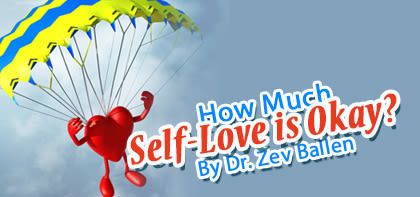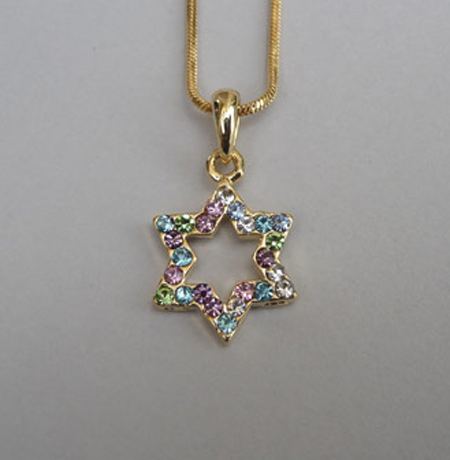
How Much Self-Love is Okay?
Taking care of peoples’ need, ours included, is usually not coming from love. It usually is coming from our worries about ourselves and others - worry is not love...

When I became religious I jumped into religious life like a skydiver leaping out of a plane for the first time – but not only did I lack experience like a first time skydiver – it soon became obvious that the preparatory training I got for my leap into Jewish life was also lacking something quite essential.
I spent my first year or so, as a baal teshuva (a newly religious person), asking my Rabbi everything under the sun about what I could do and what I couldn’t do. Looking back to that time (26 years ago), I now realized that all of the “zeal” I was feeling about my new lifestyle wasn’t because I was loving it so much. The truth is that I found many of my new obligations to G-d and to others in my community to be rather burdensome. So why was I doing it all? I suppose I did it because I was looking for approval especially from the Rabbis of my community.
One day I was sitting with my Rabbi, when it just bubbled out of my mouth: “You know, Rabbi, I’ve made all these radical changes in my life…Shabbos…Kashrus…the way I dress…and I’ve also been giving charity and trying to avoid materialism – and yet I don’t think it’s really helping me.”
“What do you mean?”
“I mean I don’t feel any more connected to myself than I felt before. I thought that by now, since I’m doing  all this stuff that G-d wants me to do that I would feel Him to be closer to me and me to Him but I don’t feel any closer to G-d than I did before.”
all this stuff that G-d wants me to do that I would feel Him to be closer to me and me to Him but I don’t feel any closer to G-d than I did before.”
“I also thought that by now I would like myself better because I’m leading my life in the “right” way – but I don’t love myself any more than I did, and I don’t love others the way I’m supposed to either. I still don’t always like who I am even though I’m routinely do all the right things (my external behaviors), I still don’t like how I feel about myself inside…I don’t like the way I think in general…I don’t like how I’m thinking about others and I don’t feel any closer to G-d than when I began.”
My Rabbi said: “Zev, don’t worry it will come…the main thing, for a Jewish man is to learn. So learn with joy…as much as you can…it’s also important to review what you learn and remember it…this is what G-d wants from you…this is Jewish life at its best. If you will learn, eventually you will be happy.”
After that he said: “…and do kind acts for others, give charity and you’ll see, in time, that you will grow very close to G-d and the people in the community who you are helping.
So that’s what I did. I cut back on working so that I could spend more time in the yeshiva learning and I stepped up my community service, but I still didn’t feel any closer to G-d, and I didn’t feel that I cared about myself or my neighbors any more than I did before.
What was missing in my training as a Jewish skydiver?
It wasn’t that the advice I received was wrong. The situation can be compared to someone who starts vigorous exercise program but still hasn’t learned about proper nutrition. Actually my diet lacked the nutrition that I needed most of all – self-love. I’m aware that this sounds like a rather odd type of nourishment for a person who aspires to a life of ego-nullification and service to others, so please allow me to explain why we must love ourselves very strongly and deeply and how we can reveal our self-love.
Most people feel that they at least care about themselves. After all, all day long we are taking care of our needs, or our children’s needs – but taking care of peoples’ need, ours included, is usually not coming from love. It usually is coming from our worries about ourselves and others – worry is not love.
There is a deep power of love that we have in our souls that is simple and pure and unconditional. On this level we love ourselves simply because we have a love for ourselves. Experiencing the pure love we have for ourselves is actually the key to feeling love for others and for Hashem.
There is a three-step process that will enable you to reveal your own self-love and once you do you’ll be able to turn it towards others and love them and love Hashem with purity and strength that is astounding.
The first step is having emuna that everything that Hashem is presently giving to you is surely what is best for you right now. Once we internalize that everything that Hashem is doing is for the best we can go to the next step which is called “being happy with your lot.” “Being happy with your lot” doesn’t just mean that we are content with the outer conditions of our lives, it also means that we can relax and be more comfortable and accepting of who we are inside ourselves too. Once we feel good about ourselves (even if our thoughts, feelings and behaviors aren’t yet as elevated as they will be some day), then we are able to reveal our true love for ourselves. The state of “being happy with your lot” and the state of self-love are very closely related, but before you can really feel self-love you must be in a calm state where you are accepting yourself as you are.
Self-acceptance is an outgrowth of your emuna in G-d. Emuna in G-d, in turn will reveal your “being happy with your lot” which, in turn, reveals deep feelings of love that you have for yourself for no reason other than you exist. Once you truly love yourself, you have reached the root of your soul which is call “knesses yisrael” (the Jewish people). [1]
At the root of your soul, your “self-love” is not simply loving “yourself” in an egotistical way. Your true love for “yourself” is much bigger than you are alone. Your “I” and therefore your mission in life is much greater than you are. By now you can see that the secular concept of “self” doesn’t apply to us. You have reached the interface of your “self” the Jewish people, Hashem and His Torah. Now it will be possible for you to love every Jew and feel connected in love to all the mitzvos (obligations of the Torah).











Tell us what you think!
Thank you for your comment!
It will be published after approval by the Editor.